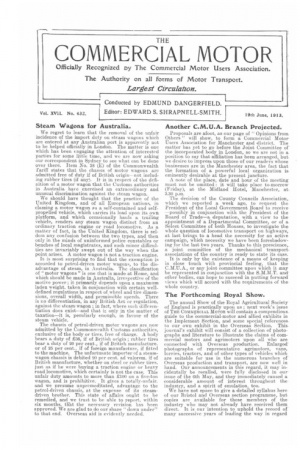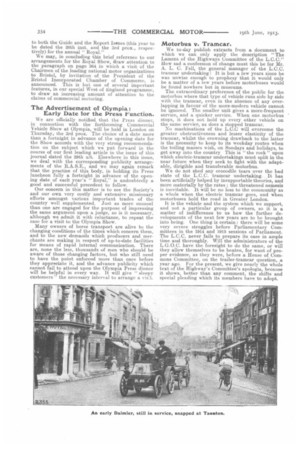Steam Wagons for Australia.
Page 1

Page 2

If you've noticed an error in this article please click here to report it so we can fix it.
We regret to learn that the removal of the unfair incidence of the import duty on steam wagons which are entered at any Australian port is apparently not to be helped officially in London. The matter is one which has been engaging the attention of interested parties for some little time, and we are now asking our correspondent in Sydney to see what can be done over there. Item No. 38 (E) of the Commonwealth Tariff states that the chassis of motor wagons are admitted free of duty if of British origin—not including rubber tires (if any). it is in respect of the definition of a motor wagon that the Customs authorities in Australia have exercised an extraordinary and unusual discrimination against the steam wagon.
We should have thought that the practice of the United Kingdom, and of all European nations„ in classing a motor wagon as a self-contained and selfpropelled vehicle, which carries its load upon its own. platform, and which occasionally hauls a trailing vehicle, renders any steam wagon distinct from an ordinary traction engine or road locomotive. As a matter of fact, in the United Kingdom, there is seldom any confusion between the two types, and then only in the minds of uninformed police constables or benches of local magistrates, and such minor difficulties are invariably swept out of the way when the point arises. A motor wagon is not a traction engine. It is most surprising to find that the exemption is accorded to petrol-driven motor wagons, to the disadvantage of steam, in Australia,. The classification of "motor wagons" is one that is made at Home, and which should be made in Australia, irrespective of the motive power ; it primarily depends upon a maximum laden weight, taken in conjunction with certain well-. defined regulations in respect of wheel and tire dimensions, overall width, and permissible speeds. There is no differentiation, in, any British Act or regulation, against the steam. wagon ; in fact, where such differentiation does exist—and that is only in the matter of taxation—it is, peculiarly enough, in favour of the steam vehicle.
The chassis of petrol-driven motor wagons are now admitted by the Commonwealth Customs authorities, exclusive of the body or tires, free of charge. A body bears a, duty of 236, if of British origin ; rubber tires bear a duty of 20 per cent., if of British manufacture, or of 25 per cent., if of foreign manufacture, if fitted to the machine. The unfortunate importer of a steamwagon chassis is debited 20 per cent, ad valorem. if of British manufacture, whether on steel or rubber tires, just as if he were buying a traction engine or heavy road locomotive, which certainly is not the case. This unfair duty amounts to more than 2100 on a five-ton wagon, and is prohibitive. It gives a totally-unfair, and we presume unpremeditated, advantage to the petrol-driven chassis, at the expense of its steamdriven brother. This state of affairs ought to be remedied, and we trust to be able to report. within six months, tli-at the necessary revision has been approved. We are glad to do our share "down under" to that end. Overseas aid is evidently needed.
Another C.M.U.A. Branch Projected.
Proposals are afoot, as our page of "Opinions from Others" will show, to form a Commercial Motor Users Association for Manchester and district. The matter has yet to go before the Joint Committee or the incorporated body in London, so we are not in a position to say that affiliation has been arranged, but we desire to impress upon those of our readers whose businesses are in the Manchester area, the fact that the formation of a powerful local organization is eminently desirable at the present juncture. A note of the place, date and hour of the meeting must not be omitted : it will take place to-morrow (Friday), at the Midland Hotel, Manchester, at 3.30 p.m. The decision of the County Councils Association, which we reported a week ago, to request the President of the Local Government Board to receive —possibly in conjunction with the President of the Board of Trade—a deputation, with a view to the appointment of a, Departmental Committee, or of a Select Committee of both Houses, to investigate the whole question of locomotive transport on highways, at last brings to a head the necessity for an active campaign, which necessity we have been foreshadowing for the last two years. Thanks to this prescience, a joint committee of the mechanical transport associations of the country is ready to state its case.
It is only by the existence of a means of keeping in close touch with provincial feeling, that the C.M.U.A., or any joint committee upon which it may be represented in conjunction with the S.M.M.T. and other bodies, can hope to succeed in putting forward. views which will accord with the requirements of thewhole country.
The Forthcoming Royal Show.
The annual Show of the Boyal Agricultural Society of England is practically upon us ; next week's issue of THE Comalyneese MoTon will contain a compendious. guide to the commercial-motor and allied exhibits in the Implement Section, and some special references to our own exhibit in the Overseas Section. This journal's exhibit will consist of a collection of photographs and literature to illustrate the claims of commercial motors and agrimotors upon all Who are connected with Overseas production. Enlarged' photographs of representative agrimotors, vans, lorries, tractors, and of other types of vehicles which are suitable for use in the numerous branches of Overseas production and transport, are now well in hand. Our announcements in this regard, it may incidentally be recalled, were fully disclosed in our issue of the 6th May, and they immediately caused a considerable amount of interest throughout the industry, and a spirit of emulation, too.
We have not space to give a detailed syllabus here of our Bristol and Overseas section programme, but copies are available for those members of the industry who may not already have received them direct. It is our intention to uphold the record of many successive years of leading the way in regard to both the Guide and the Report Issues (this year to be dated the 26th inst. and the 3rd prox., respectively) for the annual Royal." We may, in concluding this brief reference to our arrangements for the Royal Show, draw attention to the paragraph on page 364 in wnich a visit of the Chairmen of the leading national motor organizations to Bristol, by invitation of the President of the Bristol Incorporated Chamber of Commerce, is announced. This is but one of several important features, in our special West of England programme, to draw an increasing amount of attention to the claims of commercial motoring.
The Advertisement of Olympia: Early Date for the Press Function.
We are officially notified that the Press dinner, in connection with the forthcoming Commercial Vehicle Show at Olympia, will be held in London on Thursday; the 3rd prox. The choice of a date more than a fortnight in advance of the opening date for the Show accords with the very strong re,commenclation on the subject which we put forward in the course of our first leading article in the issue of this journal dated the 29th ult. Elsewhere in this issue, we deal with the corresponding publicity arrangements of the R.A.S.E., and we may again remark that the practice of this body, in holding its Press luncheon fully a fortnight in advance of the opening date of each year's "Royal," is undoubtedly a good and successful precedent to follow.
Our concern in this matter is to see the Society's and our own very costly and extensive missionary efforts amongst various important trades of the country well supplemented. Just as more counsel than one are engaged for the purpose of impressing the same argument upon a judge, so is it necessary, although we admit it with reluctance, to repeat the case for a visit to the Olympia Show.
Many owners of horse transport are alive to the changing conditions of the times which concern them, and to the new demands which producers and merchants are making in respect of up-to-date facilities for means of rapid internal communication. There are, none the less, thousands of men who should be aware of those changing factors, but who still need to have the point enforced more than once before they appreciate it, and the advance publicity which cannot fail to attend upon the Olympia Press dinner will be helpful in every way. It will give " sleepy customers " the necessary interval to arrange a
Motorbus v. Tramcar.
We to-day publish extracts from a document to which we can only apply the description "The Lament of the Highways Committee of the L.C.C." How sad a. confession of change must this be for Mr. A. L. C. Fell, the general manager of the L.C.C. tramcar undertaking! It is but a few years since he was unwise enough to prophesy that it would only be a matter of a iew years before motorbuses would be found nowhere but in museums.
The extraordinary preference of the public for the motorbus where that type of vehicle rims side by side with the tramcar, even in the absence of any overlapping in favour of the more-modern vehicle cannot be ignored. The smaller unit gives a more-frequent service, and a quicker service. When one motorbus stops, it does not hold up every other vehicle on the same service, as does a stopped tramcar.
No machinations of the L.C.0 will overcome the greater obstructiveness and lesser elasticity of the tramcar, whilst the crowning drawback to the latter is the necessity to keep to its weekday routes when the toiling masses wish, on Sundays and holidays, to get away into the country This is "the rock" upon which electric-tramcar undertakings must split in the near future when they seek to fight with the adaptable, dirigible and transferable motorbus.
We do not shed any crocodile tears over the bad state of the L.C.C. tramcar undertaking.. It has been artificially helped by insupportable theories, and more materially by the rates ; the threatened nemesis is inevitable. It will be no loss to the community as a whole when the electric tramcar goes, and when motorbuses hold the road in Greater London.
It is the vehicle and the system which we support, and not a particular group of owners, so it is a matter of indifference to us how the further developments of the next few years are to be brought into being. One thing is certain: there will be some very severe struggles before Parliamentary Committees in the 1914 and 1915 sessions of Parliament. The L.O.C. never fails to prepare its case in ample time and thoroughly. Will the administrators of the L.G.O.C. have the foresight to do the same, or will they allow themselves to be beaten, for want of proper evidence, as they were, before a House of Commons Committee, on the trailer-tramcar question, a year ago. For the present, we give nearly the whole text of the Highway's Committee's apologia, because it shows, better than any comment, the shifts and special pleading which its members have to adopt.




























